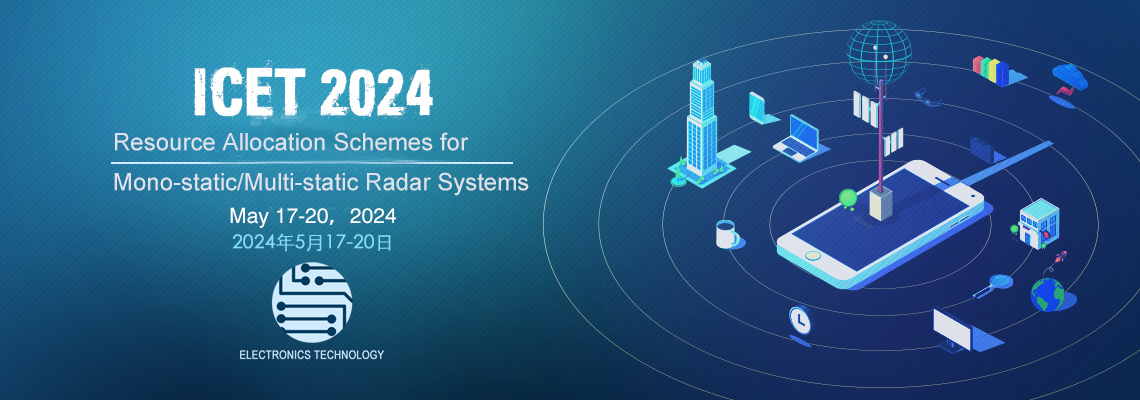Resource Allocation Schemes for Mono-static/Multi-static Radar Systems / 单基地/多基地雷达系统的资源分配方案
In recent years, considerable advances in signal processing and intelligent antenna technology have enabled the development of mono-static/multi-static radar, which perceives the environment according to the predicted prior information or online estimation and learning. This session covers latest research for resource allocation schemes for different radar systems within different application backgrounds. Resource allocation is to enhance the performance of different task objectives with regard to different types of radar systems, such as the detection probability, positioning precision and tracking accuracy through managing their limited system resources. Due to the varieties of the task requirements and environmental factors, it is still an open issue to obtain optimal scheduled schemes of system resources in practical scenarios. This special session aims to present the most recent progresses in terms of techniques and applications of resource aware management for radar networks. This session will summarize the most important efforts ongoing in this field, aiming to address for future mission.
Topics:
1. Cognitive sensing and learning methods for resource allocation in radar systems;
2. Multi-task assignment and scheduling in the context of radar network;
3. Resource aware design for target detection, localization and tracking;
4. Resource aware management for joint detection and tracking;
5. Task oriented geometric configuration optimization and path planning;
6. Resource-aware optimization for target detection, tracking and localization
7. Resource-aware design for joint radar and communication system
8. Cooperative mission assignment and management in radar network
9. Deep learning/data-driven resource-aware management for cognitive radar
ICET 2024 will take place at Chengdu, China, from May 17-20, 2024. This key electronics event should be a "must attend" on your conference calendar.
Call for Papers Timeline / 征稿时间
- Submission Deadline:
April 5th, 2024April 20th, 2024
全文截稿时间:2024年04月05日2024年4月20日
- Registration Deadline: April 30th, 2024
注册截止时间:2024年04月30日
Oragnizing Chairs
 |
A. Prof. Chenguang Shi, Nanjing University of Aeronautics and Astronautics Chenguang Shi received the B.S. and Ph.D. degrees from the Nanjing University of Aeronautics and Astronautics (NUAA) in 2012 and 2017, respectively. He is currently an associate professor with the Key Laboratory of Radar Imaging and Microwave Photonics, NUAA, Ministry of Education. His main research interests include radar signal processing, low probability of intercept optimization, radar network, adaptive radar waveform design, and target tracking. He has published more than 40 scientific articles in refereed journals, such as IEEE Transactions on Signal Processing, IEEE Systems Journal, IEEE Sensors Journal, etc. He received the Excellent Doctoral Dissertation Nomination Award from China Electronic Education Association in 2020, and received the Best Poster Award from 2021 International Conference on Autonomous Unmanned Systems (ICAUS 2021) and the Best Paper Award from 2023 International Conference on Autonomous Unmanned Systems (ICAUS 2023). |
 |
Prof. Zhenkai Zhang, Jiangsu University of Science and Technology Zhenkai Zhang received the M.S. and Ph.D. degrees from the Jiangnan University and Nanjing University of Aeronautics and Astronautics (NUAA) in 2007 and 2013, respectively. He is currently a professor of Jiangsu University of Science and Technology. He was a visiting scholar at Durham University in the UK and the University of Calgary in Canada. His main research interests include radar signal processing, radar and communication integration, radar resource management, and target tracking. He has published more than 80 scientific articles in refereed journals, such as Signal Processing, IET radar sonar and navigation, etc. He was entitled “The backbone teacher of Qinglan Project in Jiangsu Province” and ” 333 high-level talents in Jiangsu Province”. |
 |
Lecturer Yang Su, Nanjing University of Information Science and Technology
Yang Su received the Ph.D. degree in information and communication engineering from University of Electronic Science and Technology of China (UESTC), Chengdu, China, in 2023. He then joined the School of Electronic and Information Engineering, Nanjing University of Information Science and Technology (NUIST), as a lecturer. His current research interests focus on the networked radar system, radar resource-aware management, collaborative sensing and information fusion, optimization theory and low probability of intercept, target tracking. He has published scientific articles in refereed journals, such as IEEE Transactions on Aerospace and Electronic Systems, Signal Processing, IEEE Systems Journal, IET Signal Processing, Journal of Systems Engineering and Electronics, etc. |
